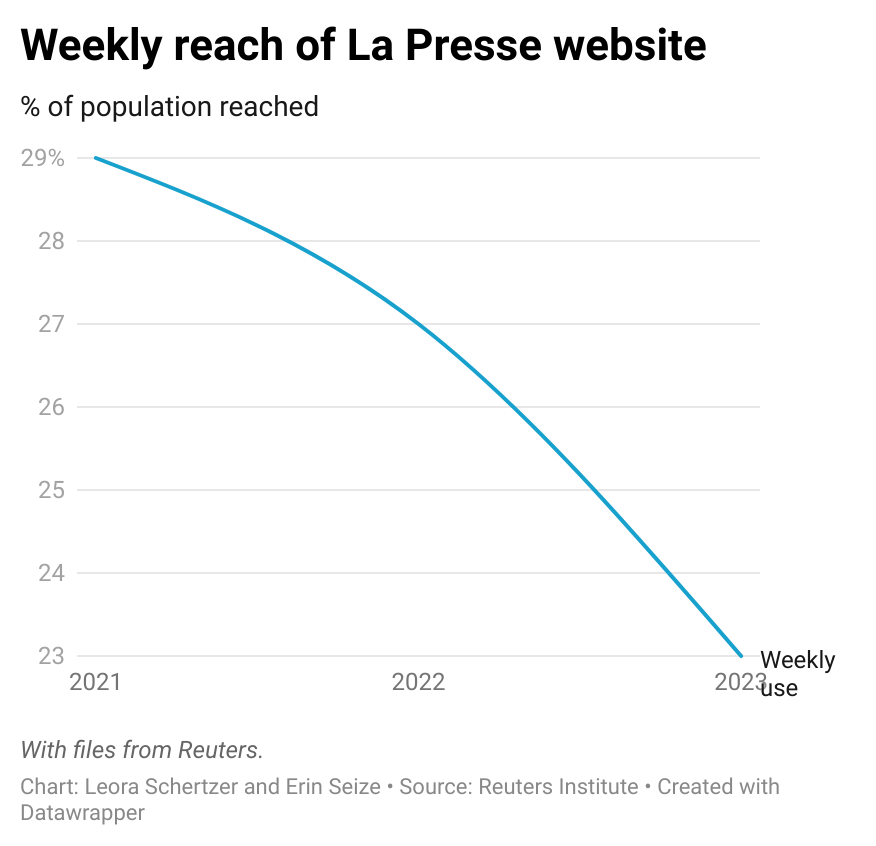Local news engagement plummets amid station closures, staff cuts
With less people looking at news and gravitating toward social media, where does this leave the future of local news?
City News journalist Gareth Madoc-Jones reporting live from Jean-Drapeau park in Montreal on Apr. 8, 2024. (PHOTO/Erin Seize)
City News Montreal reporter Gareth Madoc-Jones posted a clip from his daily news story to the company’s Instagram account on Feb. 11, or so he thought. Upon checking the page, “it just wasn’t loading,” he recalled.
News in Canada has been blocked on the Meta-owned social media platforms Instagram and Facebook since June 2023, in response to Bill C-18.
“They hadn't quite done that yet for City News Montreal,” said Madoc-Jones. “[But when they] figured out that we were also the media, [the content] was blocked and we haven't had anything on since then.”
The idea behind the bill was to force big tech to pay up for sharing Canadian news stories on their platforms. Google reached a $100 million deal with the government, but Meta decided to go another route, blocking all news for Canadians from their websites, including local and international outlets.
 Tiktok failed to load.
Tiktok failed to load.Enable 3rd party cookies or use another browser
The ban came as another blow to local news media, which has been struggling since the social media boom.
News station closures, staff cuts, and bankruptcy happen on a seemingly monthly basis for news companies across Canada over the last year.
Thirty-six Canadian news outlets closed in 2023, and Bell Media shut the doors at 45 of their regional radio stations.
Meanwhile, Instagram, Facebook, TikTok and X have grown increasingly powerful in their reach.
“Facebook was signaling even before (Bill C-18), that they weren't that interested in news. They said publicly that news accounts for a small amount of the engagement that they were seeing on their platforms,” said CBC Editor-in-Chief Brodie Fenlon. “It's hard to see them coming back right now.”
Brodie Fenlon, Editor in Chief of the CBC at his office in Toronto on Mar. 7, 2024. (PHOTO/Erin Seize)
With less people looking at news and gravitating toward social media, where does this leave the future of local news?
Despite the news ban, one quarter of Canadians primarily get their news from social media, according to a 2023 study from the Reuters Institute for the Study of Journalism.
Carleen Loney, a Concordia undergraduate student in animation, tried to transition off Instagram and get news directly from platforms like the Montreal Gazette.
Carleen Loney at Concordia University’s Loyola Campus on Mar. 16, 2024. (PHOTO/Erin Seize)
But the new habit didn’t stick. “I don't think I'm very diligent in reading things that aren't just like off of social media,” said Loney.
Another Concordia student, Emily Yang, says she spends “a lot of time on social media, scrolling” for news. “If I'm being lazy, then yes, I will just rely on Instagram.”
Concordia University’s campus radio station CJLO had over 4,000 followers on Instagram before the ban. CJLO Program Manager Cameron McIntyre sees the loss of the station’s account as an “impediment to us doing community engagement.”
CJLO program manager Cameron McIntyre at the lounge in Concordia University’s campus radio station on Mar. 8, 2024. (PHOTO/Erin Seize)
“Building back a social media platform again is tough work, [but] I think that these platforms offer very little to people who are interested in learning about things going on in Montreal,” said McIntyre.
When Madoc-Jones saw that City News’ content had been blocked, he immediately told Supervising Producer Melanie Porco. “Uh oh,” she thought.
“Has it hurt us? Of course,” she said. “We’re going to try other ways like to reach them through [the journalists’] professional accounts until someone notices that too.”
-30-












